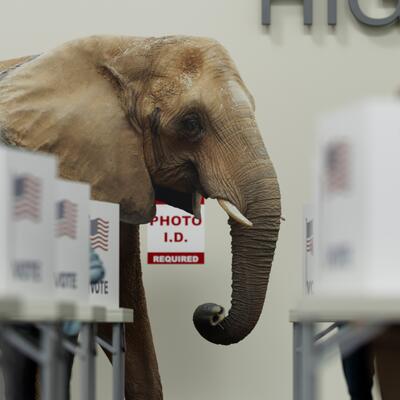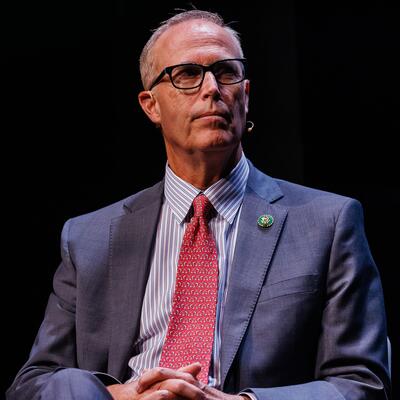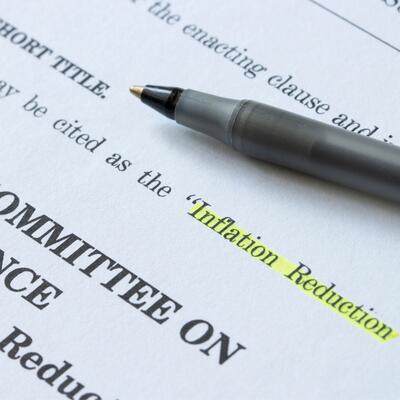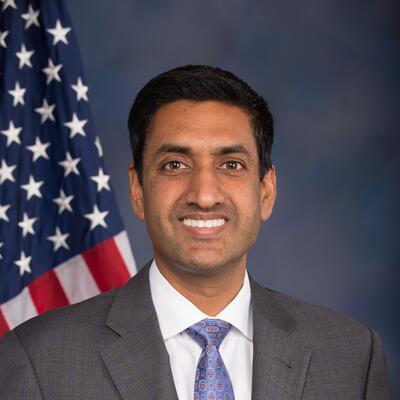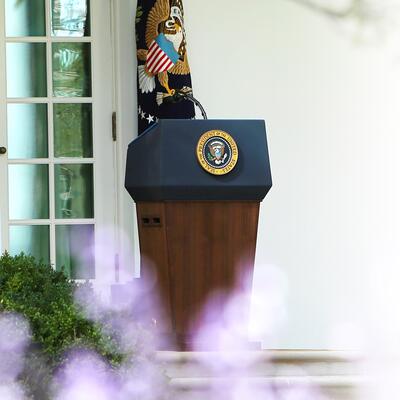
What Trump 2.0 Means for the Climate
Guests
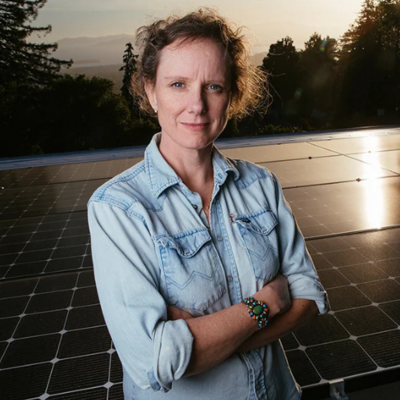
Abigail Dillen
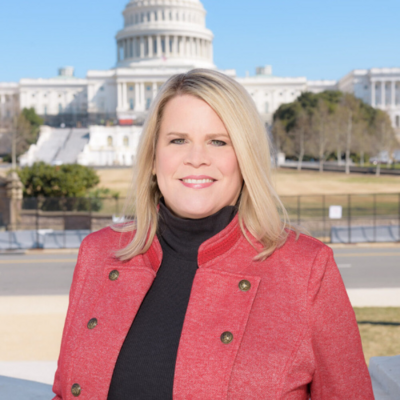
Heather Reams
Summary
For climate-concerned citizens, the recent November elections were hugely disappointing. As a candidate, Donald Trump said he would be a dictator on day one — specifically so that he could close the border and “drill, drill, drill.” There is a saying in Washington D.C. that personnel is policy. Trump has tapped people with fossil fuel industry experience to fill energy-related cabinet positions.
“We're in the greatest energy crisis the world has seen in decades. But this energy crisis has nothing to do with the scarcity of energy. It's about decision making.
Political policies, ill-informed and destructive political decision making has led us to where we are today,” says Chris Wright, CEO of Denver-based Liberty Energy and Trump’s choice to lead the Department of Energy.
“We also know that we can do things like decarbonize base load with carbon sequestration. We can decarbonize liquid fuels with carbon sequestration and enhance oil recovery. The answer here is innovation, not regulation,” says Doug Burgum, former governor of North Dakota and potential Secretary of the Interior. If confirmed, he would lead a department that supervises the nation's vast public lands and oceans where lots of energy and mineral extraction happens.
And that has Earthjustice President Abigail Dillen concerned. “I'm extremely worried about this ‘drill baby drill’ agenda because it's hard to stop. It's very much in the president's power and it's very important that Congress not act to entrench our laws to demand that kind of extraction.”
During Trump’s first term, then Senate Majority Leader Mitch McConnell was able to approve over 220 of Trump’s picks for the federal judiciary. That included the now 6-3 conservative-led Supreme Court. That would appear to be a tough environment to use the legal system to defend the environment. Yet, Dillen says under the first Trump administration they were winning the majority of our cases. “So far, our win rate is 85% and I say so far because some of those cases are still going on.”
In Congress, Republicans will control both the Senate and the House. One of the few organizations that is working to convince Republicans in Congress to work on climate issues is Citizens for Responsible Energy Solutions. President Heather Reams is optimistic that progress can be made. “All's not lost. Let me just tell you that right now.”
“Permitting reform is going to get done. Now, permitting reform is holding up clean energy. It's driving up the cost of clean energy because we're not getting the projects going in quickly enough,” says Reams. With the clean energy market being in a much more mature and stable place than it was eight years ago, there is a chance renewables win in an “all of the above” market. Reams says, “A lot of my friends who are working in clean energy say, ‘open it up. We want to compete. We're going to win and we know we're going to win. So go ahead and open it up.’”
Resources From This Episode (4)
Full Transcript
Note: Transcripts are generated using a combination of automated software and human transcribers and may contain errors. Please check the actual audio before quoting it.
Greg Dalton: I’m Greg Dalton.
Ariana Brocious: And I’m Ariana Brocious.
Greg Dalton: And this is Climate One.
[music change]
Greg Dalton: So Ariana, we’ve had a couple of weeks. The election shock is settling in. How are you feeling about it?
Ariana Brocious: Still not great. I’m pretty worried about what the next four years are going to mean for climate and the environment and lots of other things, frankly.
Greg Dalton: Democracy. Yeah me too. I think I’m trying to look at bright spots, the technology, there’s a lot more EV choices out there, they’re more affordable. Induction cooktops in people’s homes and kitchens. Heat pumps are gaining traction, more affordable. And these technologies are reducing carbon emissions. And there’s also a growing infrastructure in the US, more factories, more reshoring of manufacturing building clean energy projects.
Ariana Brocious: Yeah, those are all true. I hope those things continue. I think for me a couple of the things that are really on my mind right now are the longer term ramifications of what the change of administration will mean and thinking back to the first Trump administration and all the ways that the rule changes and actions that his administration took affected the environment in ways that we still see.
So, for example, I live near the southern border. There was this huge push to build this new border wall and to do that they destroyed sites that are sacred to Native American tribes. They pumped hundreds of gallons of groundwater in a region that's incredibly arid and dry. Um, and they severed these.
Wildlife corridors that have been there forever. And so, you know, those things aren't going back to the way they were. And I think that's one of the things that concerns me.
Greg Dalton: Yeah. I'm also concerned about the erosion of institutions that protect our clean air and clean water. And those institutions, once they're damaged, are difficult to rebuild and regain public trust.
We know that climate and environment were not top tier issues in the recent U. S. election. They never are. Immigration, inflation and other concerns were top of voters minds and people chose Donald Trump to address them.
Ariana Brocious: Yeah. And if you care about the climate crisis, it's hard to not feel pessimistic when the incoming president says things like this.
Trump: The ocean's gonna rise in 400 years an eighth of an inch, and you'll have more seafront property, right, if that happens. I said, is that good or bad? I said, isn't that a good thing? If I have a little property on the ocean, I have a little bit more property. I have a little bit more ocean.
Greg Dalton: There is so much going on there, and of course it downplays the devastation that rising oceans will have on coastal communities around the world. There is a huge ticking time bomb in the insurance industry driven by rising seas, floods and fires. But yes, it’s hard to see how a government with Donald Trump in charge is going to take climate seriously.
Ariana Brocious: And we've seen this movie before. The first Trump administration rolled back more than 100 climate and environmental safeguards and withdrew from the Paris Climate Agreement. When Donald Trump again takes office, Republicans will control both the White House and Congress – what many would see as a worst case scenario for climate policy. But is that really the case? That’s what we really want to look at this week.
Greg Dalton: Right, Republicans are speaking up for President Biden’s signature climate law that has delivered most of its benefits – in the form of money to create jobs and factories – to red districts. One indication of that is when North Dakota Republican Senator Kevin Cramer recently told the Wall Street Journal: “There are too many things in there that are too important to too many constituencies” to throw out the law.
Ariana Brocious: And in the waning weeks of the Biden administration, staff are working hard to disburse grants and loans to support the clean energy transition before Trump gets into office. So we’ll see what happens.
Greg Dalton: Let’s take a look at all three branches of government and see how climate and energy policy might fare under the second Trump administration.
Ariana Brocious: Starting with the White House. For this we’ve invited our own political junkie, Producer Austin Colon.
Austin Colon: Hey Ariana, Hey Greg, thanks for having me on to talk through such a weedy subject.
Greg Dalton: Right, so what moves have you seen the Trump team make that would have the biggest climate implications?
Austin Colon: Well, I’d have to say the choices for cabinet are probably the most concrete examples of how the incoming administration is going to handle climate and energy policy.
Greg Dalton: Right, there’s a saying in Washington that personnel is policy.
Austin Colon: It seemed only hours after Trump was declared the winner, there were announcements of nominees for cabinet positions. Some were controversial, like Fox News Host Pete Hegseth for Defense Secretary and Matt Gaetz for Attorney General.
Ariana Brocious: Of course Gaetz eventually withdrew his name from consideration and resigned from Congress.
Greg Dalton: Right, so there have been some out-there picks, but do those really affect climate policy?
Austin Colon: Well, that’s the interesting thing. For the cabinet positions that affect energy policy, Trump seems to be taking credentials much more seriously. Like for Energy Secretary he picked Chris Wright, CEO of Denver-based Liberty Energy. Wright pretty much laid out his philosophy at a TED Talk about Energy Poverty:
Chris Wright: We're in the greatest energy crisis the world has seen in decades. But this energy crisis has nothing to do with the scarcity of energy. That's not what's driving it. It's about decision making. Political policies, ill informed and destructive political decision making has led us to where we are today.
Greg Dalton: Okay so he’s a proponent of an “all-of-the-above” energy strategy. And that feels on par with what Trump himself has said on the campaign trail. Though lately he’s been focused more on unleashing what he calls the country’s “liquid gold” – fossil fuels. Even though the U.S. is ALREADY at record levels of oil and gas production under the Biden administration.
Austin Colon: Right, and you’ve been covering climate for a long time Greg, what do you think of Chris Wright and Liberty Energy?
Greg Dalton: I read the ESG report for his energy company. I was surprised his company had an ESG statement. It focuses on fossil fuels lifting people out of poverty, and ignores how burning fossil fuels is driving extreme floods, fires and droughts. The report also criticizes subsidies for wind and solar while ignoring many subsidies for fossil fuels. It’s a fairly mainstream view of a fossil fuel company focused on boosting supply rather than reducing demand.
Austin Colon: For Secretary of the Interior, which supervises the nation's VAST public lands where lots of energy and mineral extraction happens, Trump has tapped former North Dakota governor Doug Burgum.
Doug Burgum: We also know that we can do things like decarbonize base load with carbon sequestration. We can decarbonize liquid fuels with carbon sequestration and enhance oil recovery. The answer here is innovation, not regulation. That's it. We're in a cold war with China. The way you beat China China is with a strong economy. The way you have a strong economy is you innovate, which is what this country has always done, as opposed to regulate, which is, you know, both environmentally and financially trying to actually shut down entire industries, which again raises the price.
Ariana Brocious: So basically he supports innovation to deal with carbon pollution and wants to produce as much energy as possible.
Austin Colon: Yeah, some say he also supports an “all of the above” energy strategy. Though it sounds to me like his heart is still with oil and gas.
Greg Dalton: So these are people with knowledge of the industry and the ability to put Trump’s energy policy into action.
Austin Colon: Right, unlike some of his other picks which I think were chosen to completely reform or maybe even dismantle their respective agencies or departments. Clearly they are prioritizing industry knowledge.
Ariana Brocious: And what about his choice for the Environmental Protection Agency?
Austin Colon: So for EPA he has chosen Lee Zeldin, who ran for governor here in New York and lost to Kathy Hochul, but did better than expected in a very blue state. He actually does have a history in Long Island of combatting toxic chemicals, when he was a congressman. Yet, here is what he had to say about leading the EPA:
Lee Zeldin: So day one and the first 100 days, we have the opportunity to roll back regulations. There are regulations that the left wing of this country have been advocating through regulatory power that ends up causing businesses to go in the wrong direction.
Ariana Brocious: Total change from current EPA administrator Michael Regan has focused on regulations to limit harmful pollutants and contaminants, along with methane emissions. So these nominees need to be confirmed by the senate, how likely is that to happen?
Austin Colon: It's almost a certainty. The Republicans only need 50 votes to approve a nominee. They have 53 votes in the senate, so enough to approve nominees without any help from Democrats or a tie-breaking vote by the Vice President. Still some of the more controversial nominees might struggle even with the clear majority. For those, Trump has demanded that the senate majority leader, in this case John Thune, allow for recess appointments. Which means allowing the president to approve a nominee while the Senate is not in session. The constitution does allow this, though the appointment only lasts until the end of the senate's next session.
Greg Dalton: Thanks Austin for that cabinet rundown.
Austin Colon: Anytime.
[music change]
Ariana Brocious: Of course, a lot of fights about policy and regulations will end up in the legal system.
Greg Dalton: Right, and that leads to our look at another branch of government that is going to be affected by the incoming administration: The Judicial Branch.
Ariana Brocious: I invited President of Earthjustice Abigail Dillen back on the show to talk about this. Her organization brought hundreds of lawsuits against the first Trump administration, and they’ve continued to argue cases before many of Trump’s judicial appointees. But before we got into what the second Trump term will mean for many of these cases, she reflected a little on the result of the election.
Abigail Dillen: I believe in the climate deadlines the scientists are telling us about, and so Every year and what we're calling this decisive decade feels so high stakes and thinking about, um, the lost opportunity to make even faster progress in the United States. And it's not just the United States as we go, the world goes because we have such an outsized influence globally.
So I really worry about not moving fast enough to deal with climate change. And I really worry about a country where people's rights are eroded, where the rule of law is eroded. We work every day at Earthjustice on the premise that we have laws to enforce, and that we'll have fair courts, and that our government will actually serve us, and there's some things that only your government can do for you.
You know, the choices that you and I make can't just clean up the air or prevent our kids from getting. Poisoned. And I work for an organization that's called Earth Justice. And I don't think that we're going to get to a healing planet without justice for people. And that is not the worldview that, that I see.
Now President elect Trump campaigned on, and so I really worry about what the next four years will be. And I'm glad that I have a job where I have something to do about it, or otherwise I'd be having a hard time getting out of bed these days.
Ariana Brocious: Yeah, yes, I, I hear you there.
and you've been in this situation before, and we'll get into that in a minute, um, what some of the experience in the past has taught. So, with this election outcome, many environmentalists are now looking to the states to protect what the federal government may not do anymore.
California, for example, has had a waiver that has enabled it to have stricter regulations on air pollution than the federal standards, and because of California's huge size as a market and influence, those waivers allow other states to Follow California's lead, and we've seen that happen. How do you see those waivers being challenged and defended right now?
Abigail Dillen: So whenever the EPA grants California a waiver to have these standards that other states can uptake, industry always challenges them. But the law is very clear that if California meets basic standards under the Clean Air Act, EPA must approve the waivers. And so, um, the waivers have generally stood.
Right now, we have a lot of litigation making its way through the courts on the, Latest suite of standards that California has put forward, and they are foundational to climate progress around the country.
you know, if we were thinking about what the prospects would be 10 years ago, I feel very confident about California's leadership going forward. Make no mistake, I still do, but we're dealing with different courts and we're dealing with a much more aggressive federal government that will be trying to tear down state leadership rather than to go with what Congress intended back in the 70s.
Ariana Brocious: Right, and this is one of the sort of changes this time around. I think that the first time, the perception and appearance of what happened in the first Trump administration was that there was a lot of chaos, and that that actually got in the way of their ability to execute some of the things they wanted to do.
This time, um, with Project 2025 with kind of, um, an expectation of a win from the Republicans. I think it's going to be a different administration and I'm wondering how you view that. I mean, are you prepared for a more aggressive, um, You know, day one, let's get after it type of thing.
Abigail Dillen: We're really in the mode of we'll see. So, on the one hand, the biggest ideas that Trump team has put forward with respect to climate and the environment are dramatic increases in oil and gas drilling and export. That's kind of the one big affirmative policy that's been announced. And the rest is about gutting agencies, um, firing big swaths of Um, federal employees going after scientists and science in general.
to execute on big ideas, shifting. Very big federal agencies and federal programs that takes concerted work. It takes people who understand government, and it actually takes having some people in government who are laser focused on that.
When you appoint someone like Lee Zeldin to be the head of the EPA who has no experience running a big thing, doesn't know the agency, doesn't know its programs, doesn't understand its unions, I think you're going more for a chaos strategy than an execution strategy.
So Chaos works, it slows down government, if you starve government, if you chase the good people out of agencies, you're not going to get the kind of government protections that people need, but you are effectively shrinking government. So that's one way to go, but if you really want to make big moves, you can't do it with a chaos strategy.
You actually need people to work on it. So my answer to your question is, we'll see. We are prepared to be suing EPA if they get in some experienced personnel who want to gut all of our statutes, um, protections who want to be going after EPA staff. But in the event, it's chaos. That's a playbook we know very well how to deal with.
Because there are laws against chaotic government, and that's, that's where courts can step in. Even ideological judges don't like chaos.
Greg Dalton: After the break, we’ll hear more from Earthjustice President Abigail Dillen on climate cases brought by young people:
Abigail Dillen: Many people have been rightly inspired by these cases that are being brought by young people to defend their future who are saying they have a constitutional right to live on a planet that has a healthy climate.
Greg Dalton: That’s ahead, when Climate One continues.
Ariana Brocious: Help others find our show by leaving us a review or rating. Thanks for your support!
This is Climate One. I’m Ariana Brocious.
During the first Trump administration, Senate Leader Mitch McConnell approved 234 judicial nominees, including three to the supreme court. That had a significant effect on the ideology of the federal judiciary, especially the supreme court, where conservatives hold a 6-3 majority.
Mitch McConnell: We're changing the federal courts forever. Nobody's done more to change the court system in the history of our country than Donald Trump.
We're going to keep on doing it. My motto is leave no vacancy behind.
Even with a conservative judiciary, Earthjustice President Abigail Dillen says her organization was successful in defending the environment and climate.
Abigail Dillen: We were winning by far the majority of our cases. so far, our win rate is 85 percent and I say so far because some of those cases are still going on. But even When we found ourselves before new Trump appointed judges, we won many of our cases because the M. O. was so lawless and so the courts have changed significantly.
Um, we have even more, uh, judges who have been selected for their, um, ideological views that will, uh, serve a Trump administration, we have a Supreme Court that sent a very strong signal to those judges that they can decide, um, that they don't have to defer to the federal government, that they can make bolder moves to deregulate and, and do away with protections that we all depend upon.
And they don't have to fear so much reversal in some of the appellate courts. That said, I'd like to Give some comfort to everyone who's listening and worried about whether we have fair courts, the Biden administration and, um, leader Schumer in the Senate really prioritized judicial appointments and those appointments were about making sure that we had judges who believe in the role of government, who believe in the role of science.
We have a lot of good judges in the lower courts and appellate courts, and it's important to remember that the Supreme Court cannot take every case.
In fact, it takes a very tiny minority of cases every year. Yeah.
Ariana Brocious: That's a good way to frame it. one thing that's, that's active now is a request to the Supreme Court to shut down state law claims against the fossil fuel majors for damages. can you tell us a bit about how that's playing out and do we expect that to change at all with the new administration or will that change? Is that on its own timeline?
Abigail Dillen: Yeah. So, um, Just to pull back for a moment, there are many cases going on across the country where cities, municipalities are suing, you said the carbon majors, which is a great way to frame it. It's the companies who together have been responsible for the vast majority of greenhouse gas emissions. These are the big oil companies
Ariana Brocious: ExxonMobil, Shell, BP.
Abigail Dillen: that the science of climate attribution has advanced so much, we know that these companies are disproportionately responsible for climate change. And we also know that they have been lying about climate change and the role that their product oil plays in advancing climate change. And so there are many state law suits that cities are bringing saying you lied.
You're a nuisance. You are, um, you are promulgating disinformation and you're liable under state law for damages and we would like you to pay up for the damage that we're paying for from climate change. This is a very powerful strategy. What we're wondering as a society is who's going to pay for these climate disasters?
Who's going to pay to keep us safe? Who's going to pay? Uh, for new insurance as well. We're in an insurance crisis, and these lawsuits may provide an answer. Of course, the industry has been fighting them tooth and nail, and they have wanted to make the case that federal law precludes, or in the legal term preempts, these state law suits.
They are saying that the Clean Air Act occupies the whole space, um, when it comes to pollution that's driving climate change. And there are really great arguments that that's not true. These cases aren't about interstate pollution. They're about fraudulent advertising. They're about disinformation.
They're about nuisance. That should be in the province of the states. There's a case that's making its way, uh, has gone all the way up to the Hawaii Supreme Court. It's a case brought by the city of Honolulu. My friends, Vic Scherer and Matt Edling are bringing this case and they're about to. Really test what the courts will do in terms of finding damages.
But there is now a request that the Supreme court intervene. And the argument is this federal preemption argument. And, and as we speak, we're wondering what the solicitor general under the Biden administration will do in the way of filings. And if that positioning is left to a next administration, we can imagine That the position will be very different under a Trump administration than under a Biden administration.
And of course, we're wondering what the Supreme Court will do. This is, I don't want to over state that this is a hard question. It's not. It's an easy question. These are clearly state law claims and the Supreme Court should not be getting in there. But there's so much at stake for the fossil fuel industry. We'll see.
Ariana Brocious: Yeah. Yeah. Okay. So let's go back a bit to what, President elect Trump plans to do once he's in office. He's spoken repeatedly about his desire to, you know, drill, baby drill to unleash, um, quote unquote, American energy dominance, um, by really expanding oil and gas activity, um, He's announced his intended appointment of Doug Burgum for Interior Secretary. What does that agenda mean for public lands in the U. S.? How much of that do we expect to happen on lands that are, that are a public resource?
Abigail Dillen: It's really frightening. This is an area where a president has so much power. Um, and it really matters whether the U. S. is doubling down on its role in the oil and gas business. It really matters for cherished public lands. It also really matters for the waters off of our coasts. A lot of this is offshore drilling as well. We've at Earthjustice really been successful in holding the line against new oil and gas leasing. With clients over the last 10 years or more, we have been pushing so hard on the Department of Interior and saw in this administration a really important pivot. The five year plan that we have in place now for offshore drilling is, has gone from 40 lease sales on average to only three contemplated over the next five years. That is the direction we have to be moving both to protect our lands. We are the biggest oil and gas producer in the world. The federal government has to shift direction on that. And we have to send a single signal globally. That it's possible to keep oil and gas assets unburned, right? If if the US doesn't do it, who will? And so I'm extremely worried about this drill baby drill agenda because it's hard to stop. It's very much in the president's power and it's very important that Congress not act entrench our laws to, to demand that kind of, um, extraction on our public lands going forward.
Ariana Brocious: Right. Let's go back to, to one other positive place where there's change, which is the states. And you mentioned Hawaii in the case that's being, um, that's being worked through there. What's another example of cases being handled in states that could have really far reaching positive implications?
Abigail Dillen: let me give you one example in Hawaii again. And then let me give you an example of the broader strategy that's working all around the country, even in the reddest of red states.
So the Hawaii example is, I think many people have been rightly inspired by these cases that are being brought by young people to defend their future who are saying they have a constitutional right to live on a planet that has a healthy climate. In Hawaii, there is such a constitutional right in the state constitution.
And there is this idea of a public trust, that a state holds all of our environmental resources in trust for all of us. And young people brought such a smart case that we were privileged to litigate with our children's trust that said, in Hawaii, it's the transportation system that is the biggest contributor to climate change.
very much. These are kids who've been through catastrophic flooding, who've lost homes in the Maui wildfires. They have every right to be before the courts demanding. that their government do better. And in this case, ultimately the Hawaii Department of Transportation was willing to settle with our plaintiffs and agree to a game plan that will get to zero emissions transportation in Hawaii on a binding schedule.
Now departments, it's amazing. And, and in, um, In Hawaii, as in so many states, the Department of Transportation is a state controlled entity. It is largely a state funded entity. And around the country, what we're seeing is kind of a failure of vision, ideas, a blueprint for how you get to where we need to go on transportation, which is the lion's share of greenhouse gas emissions all across our country.
So in Hawaii, you have this Really smart head of the Department of Transportation who has now enshrined in a binding settlement, a roadmap that's applicable all around the country. So the states that want to make progress now have a model for doing so. And You know, it's, it's more expensive. It's harder to do things in Hawaii.
So if you can do it there, you can do it anywhere.
So that's Hawaii. Uh, so can I give you a few lines on our public utility commissions?
Ariana Brocious: Yes, these are, well, let's just say, in case listeners aren't aware, these are tremendously important and often overlooked or misunderstood, um, entities that regulate lots of things at the state level, predominantly, um, I mean, Electricity generation, transmission, things like that.
Abigail Dillen: I even like to think, not like to think, I think they're invisible to most people. You know, we just turn on the light switch. We don't think about where our energy comes from, much less who decides. But that happens at public utility commissions in every state. And so when Trump says, drill, baby, drill.
That's his power over our energy mix. But where we get our electricity from, how renewables prosper in our economy, that's left to decisions that are made in trial type proceedings in 50 states around the country. And the decisions are based on what's most economic, what's most affordable for customers, gas and coal and Goodness forbid, oil cannot compete in the power markets with wind and solar and batteries.
They just can't. And so, especially with some of the tax credits that were added into the IRA, the economic calculus for going to renewables is so strong. And we're able to go. into these public utility commissions, into these lawsuits, basically, and make the case for the most affordable energy. We're also able to say unfair competition that is locking customers into more expensive energy from old gas plants, new Billion dollar gas plants, you cannot have anti competitive provisions like this.
So we're able to also tear down the barriers in a system that was made for fossil fuels so that clean energy can run faster. That's how we continue to make progress during the last Trump administration. We're going to be able to make even faster progress now because the clean energy industry is so much stronger.
They're ready to go.
Ariana Brocious: Yeah.
Abigail Dillon is president of Earthjustice.
Thank you so much for being on Climate One. We'll have you back again soon, hopefully.
Abigail Dillen: I appreciate being here so much. Thank you for all you do.
Ariana Brocious: We’re going to take a quick break. When we come back, we’ll go from the courts to congress, where the fate of Biden era laws like the Inflation Reduction Act.
Heather Reams: I'll point to the 18 Republican members who signed a letter to Speaker Mike Johnson saying: Hey, don't throw the IRA baby out with the bathwater. These tax credits have merit, and let's have a thoughtful discussion about that.
Ariana Brocious: That’s up next, when Climate One continues.
Greg Dalton: This is Climate One. I’m Greg Dalton.
Ariana Brocious: And I’m Ariana Brocious.
Greg Dalton: In January, the Republicans will control the White House and Congress. Meanwhile the Supreme Court has a 6-3 conservative majority, so you could say they control all three branches of government. We’ve covered 2 so far: the Executive and the Judicial. Now let’s talk about the other branch: Congress.
Ariana Brocious: In the senate, Republicans will have a 53 to 47 majority, fairly decisive. But in the house they will have a quite-thin majority – only five votes. Those slim margins mean compromise will be a big part of the next legislative session.
Greg Dalton: One of the few groups working to get conservative members of congress to take on climate issues is the Citizens for Responsible Energy Solutions, or CRES. I invited CRES president Heather Reams back on the show to get a sense of where climate and energy policy stands in the new Republican Congress.
Heather Reams: All's not lost. Let me just tell you that right now. I know there's a lot of concern about, um, what's going to happen with climate action. There's a couple of things that give me, um, some hope. One is the, uh, the fact that permitting reform is going to get done. Now, permitting reform is holding up clean energy.
It's driving up the cost of clean energy because we're not getting the projects going in a quick, quickly enough. And there's also oftentimes litigation that can drag out for a decade or more. So permitting reform is going to happen. It's going to have guardrails to continue to protect the environment, but it's going to create more certainty for businesses, particularly clean technologies to be able to deploy, um, more quickly so we can get clean energy on the grid.
So, I think that's like the number one thing that can happen, whether that's in this Congress, which is the lame duck, the end of this Congress, or starting in the next Congress in 2025.
Greg Dalton: Yeah. And that means that there's a lot of wind and solar ready to be connected, but it can't get the wires to connect the wind and solar from where it's generated to what's called the load centers, the population, the cities where that is needed. And that's been a big problem. Um, also that could open up a lot of, uh, more oil and gas as well.
So you think that's going to be an okay, about net favorable balance that it won't, uh, permitting reform won't unleash more dirty than clean energy.
Heather Reams: Well, you know, a lot of my friends who are working in clean energy say, open it up. We want to compete. We're going to win and we know we're going to win. So go ahead and open it up, build the pipes, give us the wires. we need, A lot of American homegrown energy. Let's make it happen.
we want to unleash what we can do. We want to really demonstrate what we can do. You know, just give them a chance. So I think permitting reform is an awesome opportunity for us. Another one I'll give you is, uh, nuclear.
And, uh, the idea of strong and firm baseload power 24 seven.As you know, we've brought back online, a number of nuclear power facilities, uh, because we need that power.
Greg Dalton: To give fuel our, our, our growing and advancing economy.Though this country has not built a new nuclear power plant on time on budget in a long time, the most recent ones, what, what, 18 billion over budget, uh, you know, consumers and perhaps some investors, uh, you know, Got stuck with that cost overrun. So I'm curious how you're why you're so confident on nuclear when the industry hasn't delivered the price of nuclear has been going up the price of many other Energy sources have been going down
Heather Reams: Well, I'm looking for an area of bipartisanship. And I think nuclear has that. The second piece is that the, uh, the nuclear industry itself wants to streamline. They want to work with the government to make sure that nuclear is safe. the waste is stored properly. And there was just a lot of positive movement for that.
So, no, I'm certainly not saying Greg that we're going to wave a magic wand and the nuclear is going to be inexpensive and everywhere, but I think it's a great area of bipartisanship.
Greg Dalton: You wrote that this was a good election for the future of clean energy noting, uh victories of republicans like john curtis, uh Of Utah, who's now moving from the house to the Senate to take the seat formerly held by Mitt Romney. John's been on our show a couple of times, love talking to him about energy and his, uh, upgraded house and all sorts of things impact on the outdoor and winter, uh, sports industries there in Utah.
Greg Dalton: So there are some wins, but overall the tone seems to be, you know, pretty skeptical of anything that's the clean energy. Um, so. If you're looking at the people who are elected and now in power, particularly, uh, in the cabinet, um, a lot of fossil fuels, uh, pretty strongly and a lot of skepticism about climate.
So how do you feel about that aspect of it?
Heather Reams: Well, this goes to my, probably my overall, outlook about how we tackle the climate crisis that it is a, a bipartisan issue. It is not just an American issue. It's an international issue. And we need everyone at the table working together. So when you're pointing out the fact that there is someone who may be running the Department of Energy, who has a fossil fuel background, it doesn't mean he or she, in this case, he is not in favor of all the above.
Once you see wind, solar, hydropower, nuclear, and all those other pieces. So what CREST is trying to do in my organization is, is educate. Republicans, but really the public about how working together is so important. What not one party, much less one nation is going to solve the climate crisis. We need everyone working together.
Now, you may have listeners who say we cannot have any more fossil fuels. They can't happen. And if anyone who brings any more online is is a problem. And to those people who say that, I'll say, if we just place coal, um, and then replace it with natural gas, say in India or any of these developing nations, we are going to reduce emissions just like we did in the United States with a 21 point drop in emissions.
It was significant for us. It can be significant. And the next decade for those developing nations, and then we continue the energy transition to other cleaner forms of energy, but you can't blame a country for wanting power today, right? For their citizens. So I think this is a walk, and I think.
Republicans, particularly those that are coming into the Trump administration, understand that or they're starting to understand that. And believe me, um, they will understand it once we start talking to them.
Greg Dalton: Right. And one organization is the conservative climate caucus, which I think is in the house. John. Curtis of Utah used to chair that. Um, and they are members that it's an education forum. They go on field trips, but they don't endorse any specific legislation. So they don't do the really hard stuff, which is, are you for or against this particular language, this particular bill, um, what does that say about where we are, where it's at, we're kind of at that, you know, soft education place and not like, let's write bills and get things done.
Heather Reams: Well, I think that's starting to change too. Um, they wanted to start the caucus and have an open policy. Come in, learn, come see things,hear from leaders, from both sides of the aisle, hear from industry about what it means, why companies, for instance, are choosing a net zero goal.
You know, it isn't that they're making a profit on this, right? There's a business decision there. So it's helping Republicans understand that this isn't about government mandates. This is about what's good for business. It's also what's good for the planet, right? So I think that that's been going on, although we're going to have a Whole new group of members that are starting in the new Congress.
We're going to have to educate, but I think there are enough members where we can start to create and kind of like mini caucuses among the caucus, a cadre of members who are going to sign letters, decide to vote on bills. And I'll point to the 18 Republican members who signed a letter to Speaker Mike Johnson saying, uh, Hey.
Don't throw the IRA baby out with the bathwater. These tax credits have merit, and let's have a thoughtful discussion about that. So we're starting to see how this caucus and the Bipartisan Climate Solutions Caucus can be helpful in pushing an agenda for Republicans in climate.
Greg Dalton: Right. And part of the focus of that letter from sort of Republicans and sort of swing districts, moderate members was please protect part of the Inflation Reduction Act, President Biden's, you know, Keystone climate law. And that had all sorts of incentives. It was largely tax policy, wasn't many mandates, many more carrots than sticks, lots of Republican ideas in there.
Money into projects incentives for energy out of projects incentives for people buying EVs and heat pumps So what do you think is going to be protected? And what what do you think is going to be? Rolled back. We certainly hear a lot about the EV. Uh, 7, 500 federal tax credit as being on the chopping block
Heather Reams: For sure. Now, because it was a partisan process, the Republicans don't feel like they have quote, skin in the game, but you rightly point out that a vast majority of the investments that are happening are going to Republican districts and members and those districts. Understand that there's investments are there.
and we're making the case to them every day, uh, to be able to protect those tax credits.
So one of the criticisms you brought up the 30 D tax credit, which is the 7500 rebate. If you were tax credit, you get for buying an E V. Uh, that's, it's an expensive tax credit, um, as tax credits go and are we reducing emissions enough for the money that, that we're put, the treasury is putting out?
Greg Dalton: versus do we use that same pot of money and put it towards another tax credit? I'm not saying heat pumps, but for instance, something else I can help lower emissions too.Right, but it's also uh, these are looked at as pay fors forto go help for pay to extend the corporate and individual income tax Cuts that happened in 2017
Heather Reams: definitely talk of this is a pay for for the Trump tax package from 2017. You're right about that too. But you know, Republicans are willing to champion tax, tax policies that are going to spur economic growth at the end of the day. So you don't necessarily need to pay for, for every single tax credit if they're spurring investment, which the IRA is, and we can show that.
Um, and because we have. We have the data right now to be able to demonstrate that a lot of these tax credits don't need addition, you know, to be paid for in certain ways. Um, I think, I think there's a case to be made. I mean, even senate finance, uh, committee chairman, or incoming chairman Crapo had said, um, he wants pro growth policies and he's a bit at odds with what the house is talking about doing.
So there is not, one way of thinking about this from Republicans, but there is concern about the debt and how we balance all the things that president Trump said on the campaign trail, all the tax credits and things that he's promising versus the, the IRA tax credits as well. It's a lot of money.
And I think this Congress has its work cut out for him.
Exxon CEO, Darren Woods recently encouraged the U S to stay in the Paris climate agreement because it provides business certainty. He also said the need to reduce greenhouse gas emissions is not going away.
Greg Dalton: What do you make of his comments and what impact will his and similar voices have on policy? Traditionally, you know, uh, Republican. Administrations listen to the Chamber of Commerce and the sort of establishment corporations like ExxonMobil.
Heather Reams: Yeah, I mean, I think it's a sign of the times when you're having Darren Woods, the head of Exxon, saying, look, stay in Paris. We're reducing emissions because it is part of their business plan now. And most, Any company that I'm working with, Fortune, I'll even go to say Fortune 500 companies, are all having some kind of emissions reduction, ESG goals, and whatnot.
This is, this is not anything now that is flipping from one administration to the other, or one political spectrum to the other. It's what corporate America is doing. Wall Street's figured this out. Main Street has figured this out in terms of reducing emissions. Pennsylvania Avenue still hasn't figured this out.
and that's the work that's got to get done. And I think the education, this is why a caucus is helpful. This is why when you're a new administration, we're very excited about getting in and talking to those in the new administration, like there's a lot going on here. Did you know, don't forget, you know, Trump was, was president.
Um, you know, a cycle ago, right? Or four years ago. The world has changed. Um, energy prices have changed. Technology has skyrocketed. It continues to grow exponentially. So there's a lot of education there. We'll need to do. We're also not dealing with the same, um, Cabinet members nominees that we saw before, too.
This is a new crop of people. So maybe this is new thinking, um, bringing in, um, Governor Doug Burgum from North Dakota and creating a National Energy Council to really look at our energy, uh, and, and figure out how we produce more of it, how we produce it cleanly, how we export it. I think these are things that are all on the table and they're going to want.
Input from the public. So I'm looking forward to getting in there. Um, and talking about the amazing case that clean energy and what it can bring to our country.
Musk helped Donald Trump get elected and is shaping his team and policies. He runs a company that sells EVs, solar panels, and battery storage. I have, uh, two of those three from that company. What are you looking for to see how Musk's commitment to EVs takes hold in the emerging administration? It's not yet clear.
Greg Dalton: Whether or how that's going to play out.
Heather Reams: think this Elon Musk slash Tesla Tesla, um, model is an excellent example of when, uh, president Trump. has someone in his ear where he listens and he gets educated. He may, you know, release that tight grip of no, like I don't want this and has an ability to educate like, whoa, the world is changing. I didn't know this was such cool technology
I think that Elon Musk also was kind of igniting and exciting part of What can be next, right? how it's going to improve our lives.
And the federal government does have a role in facilitating innovation and at times funding some of the early stage innovations.
so you think that there can be innovation and the policy ought to be to help American jobs, American supply chain. And does that mean that there should be tariffs on Chinese imports? Cause you know,Tariffs could be protective or inflationary. So it's, you know, I'm hearing the new administration say, we don't want subsidies.
Greg Dalton: Oh, but we do want tariffs to kind of protect the different forms of protection and favoritism. Right.
Heather Reams: Yep. Definitely. You're hearing from the, it's the Republican party is fairly split on this. And it's not split evenly either, uh, on whether or not tariffs are another tax. So Republicans usually don't see a tax they like, right? So if we're talking about increasing costs. Um, there is a way to leverage tariffs to be able to incent more manufacturing in the United States.
But what economists that often say is that it will ultimately be passed down to the consumer. Now there's also, but not necessarily a tax, but really a carbon intensity that we should be looking at. If you're looking at Widget A and Widget B, Widget A being built in China, Widget B being built in the United States, and it's clean or done cleanly.
More cleanly in the United States, but the premium is more right? That, uh, then what should we be purchasing? You know, the federal government has tried to do this in procurement as well, but we can ex, we could extend that. We need to understand the carbon intensity of prod pro uh, products. Just kind of like how we see calories when we go to a subway and you're like, you know, I'm gonna get the tuna because it's fish and it's good.
And, but then you're like, oh wait. I just need to get the turkey because the tuna is not healthy either when I look at the calories. Kind of the same thing with carbon emissions too. We don't realize that the cement we're getting may be getting it cheaper from China, but we're paying for it in emissions.
Greg Dalton: Right that mayonnaise and the tuna is this yeah, so
Heather Reams: me every time
Greg Dalton: Yeah, if we only we had that kind of uh calorie counters for carbon emissions on uh, kind of at the consumer
Heather Reams: Come on. I would choose something different. I think a lot of people would too. So that transparency is powerful.
Greg Dalton: Heather Reams. Thank you so much for sharing your insights president of citizens for responsible energy solutions Thanks, heather
Heather Reams: Thank you, Greg.
Ariana Brocious: And that’s our show. Thanks for listening. Talking about climate can be hard, and exciting and interesting — and it’s critical to address the transitions we need to make in all parts of society. Please help us get people talking more about climate by giving us a rating or review. You can do it right now on your device. Or consider joining us on Patreon and supporting the show that way.
Greg Dalton: Climate One is a production of the Commonwealth Club. Our team includes Brad Marshland, Jenny Park, Ariana Brocious, Austin Colón, Megan Biscieglia, and Ben Testani. Our theme music is by George Young. I’m Greg Dalton.
